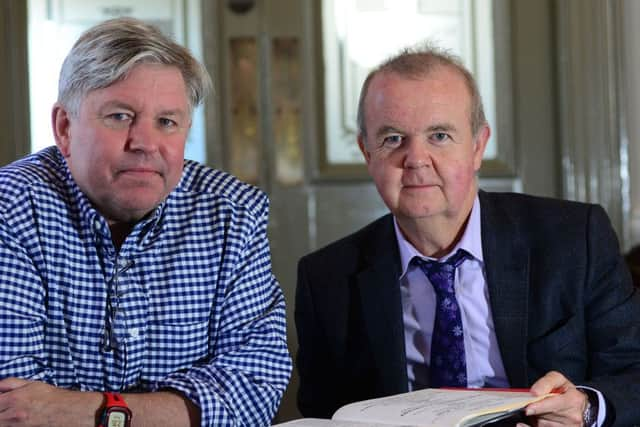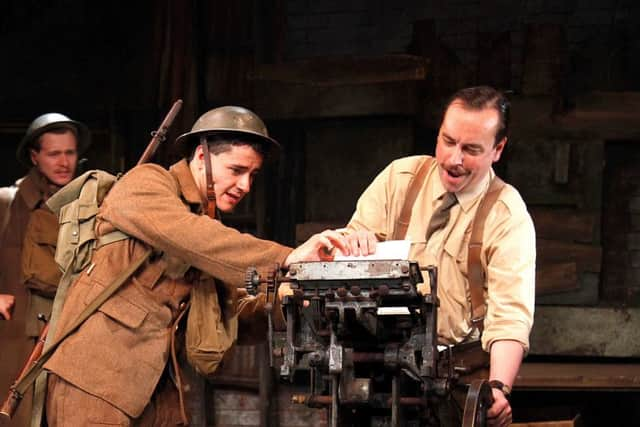Laughing in the face of war - The Wipers Times comes to Yorkshire


“We’ve got the accompaniment from Cats,” says Ian Hislop, with a chuckle. “I’m just waiting for the rousing climax.”
He’s referring to the music spilling up from the foyer downstairs where members of the cast of the Andrew-Lloyd Webber musical are being put through their paces ahead of tonight’s performance.
Advertisement
Hide AdAdvertisement
Hide AdIt’s a slightly surreal backdrop for a conversation about a story emanating from the First World War, although perhaps a suitably amusing one as it turns out.


Hislop, editor of Private Eye, and his long-standing writing collaborator and friend Nick Newman have travelled to Sheffield’s splendid Lyceum Theatre to talk about the stage version of their award-winning BBC film, The Wipers Times, which tells the true story of the satirical newspaper created amidst the mud and squalor of the Somme.
The story dates back to 1916 when Captain Fred Roberts and Lieutenant Jack Pearson discovered a printing press in the bombed out ruins of a building in the Belgian town of Ypres. Rather than leave it the two officers decided to use the press to publish a newspaper for the troops which they called The Wipers Times (Ypres was mispronounced ‘wipers’ by British soldiers). Rather than being a sombre journal about life in the trenches it was witty, subversive and helped lift the spirits of the men on the frontline.
Hislop, best known as a panellist on the BBC’s satirical news quiz Have I Got News For You, came across the story of The Wipers Times around 15 years ago while working on a documentary. “It made me laugh out loud just how black it was and when I showed it to Nick we both decided it was a brilliant story,” he says.
Advertisement
Hide AdAdvertisement
Hide Ad“It was just like a 1916 version of Private Eye and it reminded us very much of the kind of stuff we do,” says Newman. “It was two men trying to come up with jokes about stuff, only they were in somewhat more strenuous circumstances.”


For Hislop it stands the test of time. “People can be very patronising about old humour saying it was funny for its time, but actually I think The Wipers Times is really funny now,” he says.
“They loved the music hall so they did endless fake musical shows. There’s one called ‘Over the Top’ and the review underneath says ‘it’s a gas’. This was right after the first and most horrific gas attacks which both of these guys were in. Roberts was actually injured and back he comes doing gas jokes. It’s pretty extraordinary.”
Most accounts of the Great War focus on the death and carnage but they felt this offered another, more humorous, side to the story. “We get a lot of our First World War knowledge from the 1920s and 30s and this was written that afternoon in 1916. If you want to hear a voice from the trenches we’ve got one, says Hislop.
Advertisement
Hide AdAdvertisement
Hide Ad“There’s a fake advert for a flammenwerfer and it says, ‘Has your boy got a mechanical bent? It’s this Christmas’s must have toy,’ and it’s a flamethrower, which had just been introduced at the Front. It’s a terrible new weapon and what do Roberts and Pearson do? They turn it into an advert for your son.”


This gallows humour was a kind of coping mechanism for men in the trenches and proved hugely popular with the men. The original newspaper continued up until the end of the war, but given the fact it sailed close to the wind and lampooned the top brass how were they able to get away with it?
“We kept finding bits in The Wipers Times where they thank various senior officers for defending them. It became clear to us that someone thought this was funny and acceptable and someone also thought it obviously wasn’t and should be stopped.”
Also, as Newman points out, the two men were heroes. “Roberts got the MC (Military Cross) at the Somme and Pearson also got the MC and the DSO (Distinguished Service Order) so they were immune from attack.”
Advertisement
Hide AdAdvertisement
Hide AdThe newspaper mixed satire with mock reviews, adverts as well as poetry written by some of the troops so when Hislop and Newman wrote their script they already had the raw materials.


“Some of their jokes are fully formed sketches so we let them run, with others we had to give them punchlines,” says Hislop.
“There was an awful lot of poetry which Roberts hated and he would talk about there being an outbreak of ‘poetitis’ in the ranks.”
Their BBC film version of The Wipers Times, starring Ben Chaplin and Michael Palin, came out in 2013 to great acclaim, but writing for the stage was a different kettle of fish.
Advertisement
Hide AdAdvertisement
Hide Ad“It’s the most exciting thing we’ve ever done. You’re putting your head above the parapet in a very public way,” says Newman.
“You’ve also got no control,” adds Hislop. “Normally I’m the control freak editor, or I’m performing it myself and if it goes terribly wrong it will be my fault or there’s something you can do. Sitting in the stalls seeing other people creating your work you’re so helpless.”
After writing the play they were sent memoirs by the families of Pearson and Roberts, who both survived the war, and the more they found out about them the more they admired them.
“Pearson’s was only nine pages. He wanted to record his own memories and we read them with some trepidation because you think ‘what’s he actually going to be like?’ But luckily his voice was exactly the voice we imagined,” says Newman.
Advertisement
Hide AdAdvertisement
Hide Ad“They were clearly very good friends and then he (Pearson) did a joke which convinced us that we’d got him right,” adds Hislop. “He talked about walking down the Menin Road, which was incredibly dangerous, and said ‘the important thing is you should never go down Menin Road except with a friend and the friend I always chose was Johnnie Walker.’ You read that and think ‘well that’s it, you are everything I hoped you were.’ That sort of made it for us.”
You sense this is a very personal project for them. “We are immensely impressed by that generation and what they went through on our behalf. To try and preserve their memory is what it’s all about for us,” says Newman.
“For thirty years we’ve been attacking governments and making not a jot of difference, this is the one thing in our writing careers that has actually made a difference because it has brought these men to the fore.”
Hislop nods in agreement. “The thing I like about The Wipers Times is yes they were a doomed generation but they weren’t entirely passive. They didn’t just get up in the morning and walk into the machine-guns. There was energy and there was life that made them better than cannon fodder.
Advertisement
Hide AdAdvertisement
Hide Ad“We have this idea that we’re incredibly brilliant and sophisticated now and these people in the past are quite sad. But they’re not and if you take Pearson and Roberts they’re funnier than we are and they did it in much tougher circumstances.”
The Wipers Times, Lyceum Theatre, Sheffield, November 3 - 5. For tickets call 0114 249 6000.
Story of The Wipers Times
The Wipers Times started in 1916 after two British officers discovered a printing press in the ruins of a building in Ypres.
Captain Fred Roberts, editor, and Lieutenant Jack Pearson, sub-editor launched the satirical newspaper that turned the horrors of warfare into black comedy, raising the morale of the British troops who read it in the process.
Advertisement
Hide AdAdvertisement
Hide AdJust a hundred copies of its first edition were printed, but this quickly rose to reach around a thousand copies, running through the remainder of the war until December 1918.
After the war Roberts returned to prospecting and died in Canada in 1964. Pearson travelled to Argentina to work as an engineer. He died in 1966.